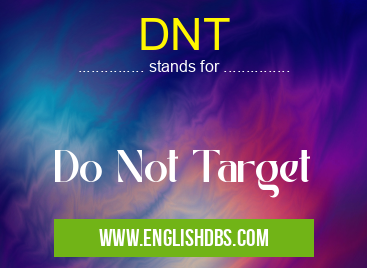What does DNT mean in UNCLASSIFIED
DNT stands for Do Not Track, a privacy feature that allows users to opt out of being tracked by websites and online advertisers. By enabling DNT, users can prevent third-party trackers from collecting their browsing data, including their IP address, browsing history, and website interactions.

DNT meaning in Unclassified in Miscellaneous
DNT mostly used in an acronym Unclassified in Category Miscellaneous that means Do Not Target
Shorthand: DNT,
Full Form: Do Not Target
For more information of "Do Not Target", see the section below.
Meaning of DNT
The DNT feature is designed to give users more control over their online privacy. When DNT is enabled, websites and advertisers are expected to respect the user's preference and refrain from tracking their online activity. However, it's important to note that DNT is a voluntary mechanism, and some websites and advertisers may not comply with DNT requests.
Functionality of DNT
DNT works by sending a signal to websites and advertisers that the user does not want their browsing data to be tracked. This signal is typically transmitted through the user's browser settings. When a website receives a DNT request, it is supposed to disable any tracking mechanisms that may be in place, such as cookies, web beacons, and fingerprinting techniques.
Benefits of Using DNT
Using DNT can provide several benefits to users, including:
- Increased Privacy: DNT helps users protect their privacy by preventing third-party trackers from collecting their browsing data. This can help reduce the amount of targeted advertising and data mining that users are subjected to.
- Reduced Data Collection: By opting out of tracking, users can limit the amount of data that is collected about them online. This can help reduce the risk of personal information being misused or compromised.
- Greater Control: DNT gives users more control over their online experience. By enabling DNT, users can make a proactive choice to protect their privacy and limit the amount of information that is shared with advertisers and other third parties.
Essential Questions and Answers on Do Not Target in "MISCELLANEOUS»UNFILED"
What is DNT (Do Not Target)?
DNT is a browser setting that allows users to opt out of targeted advertising. When DNT is enabled, websites and advertisers are supposed to refrain from collecting and using data to track users' online behavior for advertising purposes.
How does DNT work?
When DNT is enabled in a web browser, it sends a signal to websites and advertisers indicating that the user does not want to be tracked for advertising purposes. If a website or advertiser respects the DNT signal, it will not collect or use data to create targeted ads for that user.
Is DNT effective?
The effectiveness of DNT depends on several factors, including whether websites and advertisers honor the DNT signal. While some websites and advertisers have committed to respecting DNT, others may not. Additionally, DNT does not prevent websites from collecting data for other purposes, such as analytics or website personalization.
What are the benefits of using DNT?
Potential benefits of using DNT include:
- Enhanced privacy by reducing the amount of personal data collected and used for advertising.
- Reduced exposure to targeted ads, which can be perceived as intrusive or irrelevant.
- Greater control over how personal data is used.
What are the drawbacks of using DNT?
Potential drawbacks of using DNT include:
- It may not be universally respected by websites and advertisers, potentially limiting its effectiveness.
- It may prevent websites from providing personalized experiences or relevant ads.
- It may not prevent data collection for other purposes, such as website analytics.
Should I enable DNT?
The decision of whether to enable DNT is a personal preference. If you value online privacy and are concerned about targeted advertising, enabling DNT may be a good option. However, it's important to be aware of its potential limitations.
Final Words: DNT is a valuable privacy tool that allows users to opt out of being tracked by websites and advertisers. By enabling DNT, users can protect their privacy, reduce data collection, and gain greater control over their online experience. While DNT is not a foolproof solution, it is an important step towards protecting user privacy in the digital age.
